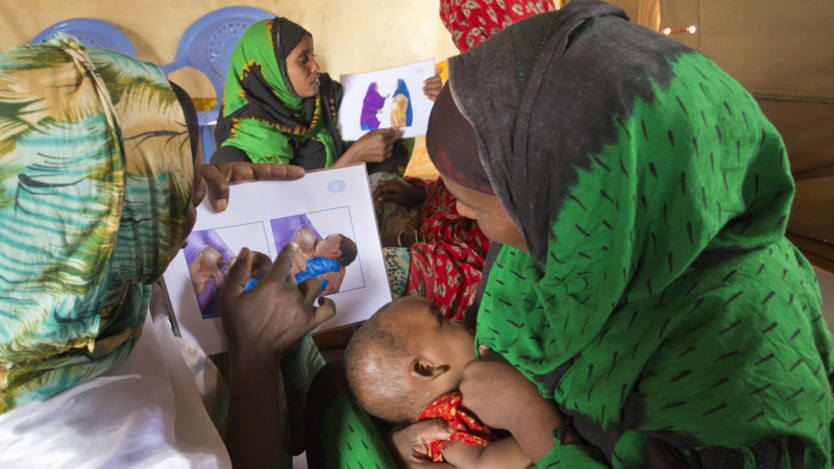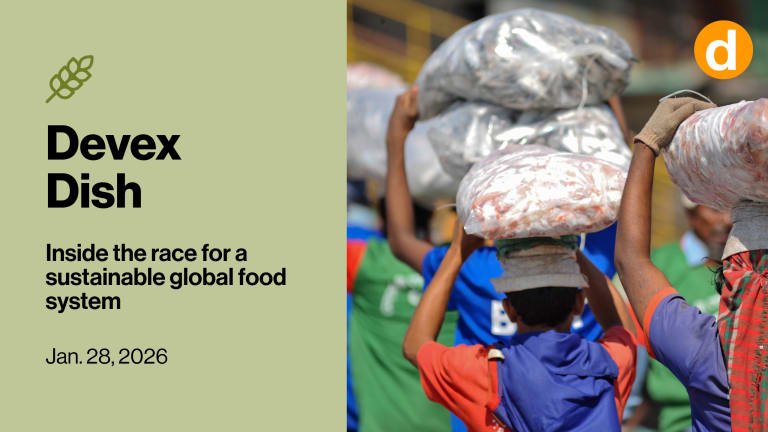
Of all the determinants of neonatal development, adequate nourishment is perhaps the most significant and is vital for the survival and development of a child. Not only this, but adequate nourishment, or lack of, has the power to create a ripple effect within societies, as the consequences of a healthy populace can be felt across broader development goals, from educational attainment to economic development.
It is this argument that provides the basis for World Breast-feeding Week. Exclusive breast-feeding — that is feeding a child exclusively on breast milk until the age of 6 months — is by far the best way to nourish an infant, and failure to do so can lead to a host of pervasive problems that thwart both individual development and the development of society at large. World Breast-feeding Week presents an opportunity to showcase the evidence, unveil misconceptions and discuss recommendations on the practice of breast-feeding around the world.
From birth to age
The positive effects of breast-feeding can be seen from birth to age, starting in the first hour of life. A study in Ghana indicated that 22 percent of neonatal deaths could be prevented through immediate breast-feeding — that is, breast-feeding a child within the first hour of birth. Immediate breast-feeding provides critical nutrients, and boosts the immune system of a baby at its most vulnerable. Additionally, early skin-to-skin contact between mother and child is vital in facilitating the mother-baby relationship, and that has a prolonged impact on the long-term development of a child. Immediate breast-feeding correlates closely with a longer nursing relationship.
From this point onwards, the benefits of breast milk multiply. In young infanthood, and while the child is still suckling, breast-feeding strongly predicts the health and growth of the child. Aside from the immunity benefits of breast milk, breast-feeding also protects a child from the risk of diarrhoea and dysentery — a leading cause of death for ages under five — by reducing the child’s exposure to such diseases. In fact, nearly half of all diarrhoea episodes would be prevented with improved breast-feeding practice in developing countries. This alone is impetus for additional investment in breast-feeding.
In later life, breast-feeding provides a catalyst for improved health outcomes, and has been linked to a reduced risk of obesity, diabetes, Crohn’s disease and cancer.
Breast-feeding can combat climate change
Choosing breast-feeding over formula can help combat climate change. Devex spoke with David Clark, a nutrition specialist at UNICEF, who explained how.
As the child reaches adulthood, additional advantages of breast-feeding in infanthood become startlingly clear. Breast-feeding positively impacts intelligence, and has been proven to positively affect learning abilities, language skills performance, and general cognitive performance.
Economic returns
It is the cognitive rewards of breast-feeding that create momentum within society that affects communities and nations at large: Higher IQs translate into improved academic performance and stronger economic performance, creating a healthier, smarter workforce with higher productivity levels.
New research conducted by the World Health Organization indicates that every $1 invested in breast-feeding has the potential to generate $35 in economic returns, and in the absence of universal optimum breast-feeding, the world forgoes hundreds of billions of dollars every year. As a result, investment in this simple practice represents one of the most lucrative forms of social impact investment in health care — not only does it deliver far-reaching health benefits but generates added value by providing an economic stimulus.
Barriers to progress
Breast-feeding should be a global priority
Breast-feeding is a clear way to improve health outcomes at scale, but it's often overlooked due to misconceptions that breast-feeding rates are higher than they are or that it's something that can be done easily without government investment. UNICEF's France Bégin calls on global leaders at U.N. General Assembly to remove barriers to breast-feeding worldwide.
Sadly, the potential of breast-feeding remains starkly unfulfilled. One common misconception that has thwarted global progress in breast-feeding practice is that babies need additional nutrients during their earliest stage of development, leading mothers to supplement breast milk with other food sources. This is both unnecessary and dangerous; the composition of breast milk is the exact formula of nutrients and water required for an infant of 6 months and below, and any deviation from this composition is unnecessary and unsafe.
A combination of wives’ tales such as this and general misunderstanding and misinformation surrounding breast-feeding has meant that exclusive breastfeeding is practiced by just 40% of the world’s young mothers. This must change.
Action in the developing world
Exclusive breast-feeding is commonly hailed as a rare natural safety net that can largely offset the impact that poverty has on health outcomes — breastfeeding has the power to dramatically improve overall well-being and labour force productivity even in the lowest resource settings. It is of this logic that breast-feeding becomes of critical importance in the developing world, which suffers both poor health outcomes and weak economic growth.
Not only does breast-feeding save lives — it is estimated that scaling up breast-feeding could save 823,000 lives per year — but its direct links to economic growth and prosperity elevate its significance in shaping global public policy.
The World Health Assembly aims to increase the percentage of children who are exclusively breast-fed to 50 percent, requiring an additional $570 million per year. Key priority areas include increasing investment in breast-feeding practice, targeting legislation around breast milk substitutes, upholding maternity protection in the workplace, and providing counselling and training for women on breast feeding, to tackle this issue.
The factors affecting breast-feeding are complex and there is no one fix that fits all. Yet further research, investment and commitment to increasing breast-feeding around the world can no longer lie at the wayside. The very fact that this simple and wholly natural technique of child care can impact individual, community and nation is incentive for immediate action, and it is my hope that World Breast-feeding Week 2017 will leverage this cause, ensuring that children all over the world experience the full benefits of breast milk, from birth to age.
Join the Devex community and access more in-depth analysis, breaking news and business advice — and a host of other services — on international development, humanitarian aid and global health.
Search for articles
Most Read
- 1
- 2
- 3
- 4
- 5








